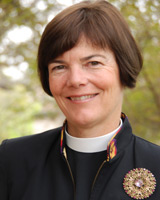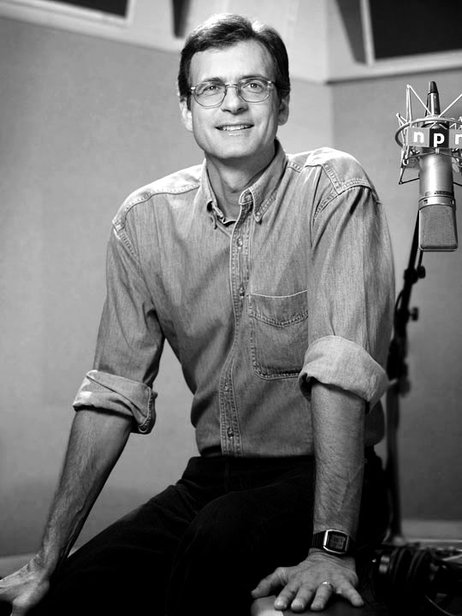
Cynthia Briggs Kittredge (@cbkittredge) is the 8th Dean and President of Seminary of the Southwest and professor of New Testament. Dean Kittredge holds degrees from Williams College and Harvard Divinity School.

John Burnett is a correspondent for NPR based in Austin, TX. Currently, John serves as NPR’s Religion correspondent. John attends All Saints Episcopal Church in Austin. (Photo courtesy of NPR.org)
On June 1, 2013, the Rev. Cynthia Briggs Kittredge became dean and president of Seminary of the Southwest. She is the eighth president of the 61-year-old Austin seminary and only the third woman to lead an Episcopal seminary. Kittredge, 56, has been on the faculty since 1999 and has served as academic dean since 2010. Growing up in Tuxedo Park, NY, the oldest daughter of a Manhattan lawyer and a homemaker, she says she wanted to be a priest since she was 12 because of “wanting to pay attention to what’s most important.” Dean Kittredge recently sat down for an interview with John Burnett, the Austin-based correspondent for NPR and a parishioner at All Saints Episcopal Church.
Listen to the six-part interview here:
Getting to Know Dean Cynthia Briggs Kittredge: The Introduction
What is the Seminary of the Southwest?
Pushing Borders: A View for the Future
Being Church: Leaning Into Culture
Exploring the New Church: A Lesson in Hermeneutics
John Burnett: Tell me what’s on your bedside table. What are you reading right now?
Cynthia Brigss Kittredge: I’m reading some stories of Alice Munro, the Canadian short story writer. She’s wonderful. And I’m reading a book called Into the Silent Land by Martin Laird about contemplative prayer. I also have O Magazine, Texas Monthly, the New Yorker and Poetry Magazine.
JB: What do you do to relax?
CBK: I like to do yoga. I go to a wonderful teacher at Good Shepherd Episcopal Church, she has a Zoroastrian background. I also make jewelry, knit, and do watercolor paintings.
JB: Where did you go on vacation this summer?
CBK: Since 1971, I’ve been going with my family to a 130-acre island in the Bay of Fundy (formed by Maine, New Brunswick and Nova Scotia) where we’re the only family on it. We have 90 sheep and we go there with our kids and my mother. I’ve been going since I was 13.
JB: Have you worked the sheep into sermons? That’s made-to-order.
CBK: One of the rules the preaching professor, Micah Jackson, and I agree on is never ever preach on sheep. We’re quite doctrinaire about that. In fact, I heard a sermon on sheep several months ago, and every point of the sermon was based on a completely false fact about sheep. That sheep are nearly blind, that sheep can’t take care of themselves and find food.
JB: Now that you’re president of the seminary, where are you going to take this place?
CBK: (Dean Emeritus Rev.) Doug Travis made it clear the position of the seminary was in the deep center of the church, saturated in the tradition and not at all on the ragged fringes. He strengthened our friendships with our neighboring dioceses and our constituencies in a way that was really important. I intend to continue doing both those things, and at the same time take the ministry and message of the seminary out more broadly to other parts of the church. We’ve always had bishops send us students from different parts of the country. But because we’re the second youngest seminary in the system we don’t have that established track that leads to our doors. Southwest is a well kept secret and it should not be well kept anymore.
JB: What areas do you feel need shoring up?
CBK: There are some areas that we don’t have as much strength in that I’d like to see expanded: some of our interfaith relationships, the study of world religions. We don’t have that. We rely on our colleagues at the Presbyterian Seminary for those courses. I’d like to see that have a life here. The other thing I’d like to see more of that has dwindled is ongoing education for the Austin area community and Central Texas. People with no religious affiliation are hungry for, if not theological education then introduction to spiritual disciplines and history of the church, all kinds of things that we could offer.
JB: Such as?
CBK: A course on comparative practices of meditation. They could be introduced to the philosophy of it and do some practice. I don’t think that open invitation to explore a spiritual tradition at all threatens our identity as an Episcopal Christian theological school.
JB: The outgoing dean raised $12 million. Do you have a new capital campaign in mind?
CBK: We’re very happy that the current campaign for leadership is almost finished. The primary purpose was to endow faculty chairs. Our next drive will be to create scholarships for students. Students have less and less aid from outside. They need scholarships and housing subsidies. We also have a library that’s not a library of the 21st century at the moment. And we’d also like to strengthen our Hispanic and Counseling programs.
JB: When did you get so jazzed about hermeneutics?
CBK: I’ve been waiting my whole life for someone to ask me that question. Hermeneutics is about interpreting meaning from whatever—people, texts, the world. In my case, hermeneutics means interpreting ancient texts and finding meaning in them as Scripture. These scriptural texts, amazingly, still have power and their interpretation is still argued about.
“Women be silent in church.” (1 Timothy)You don’t hear many Episcopalians ever quoting or preaching on that passage, but that line shaped Western Christianity in many ways. That was much in fashion for generations. The sentiment it conveys still lingers in our culture.
JB: What do you think organized religion gets wrong? What has to change in order for churches to survive in an era filled with restless, interconnected, ironic people who are still searching for truth?
CBK: Organized religion does plenty wrong and you’re talking to a representative of organized religion, so it’s hard for me to throw stones. (Such as) complete undifferentiated nostalgia for the past, and rejection of everything contemporary. So that won’t work. But what will work is to take some of the ways the ideals of the Christian church are in opposition to culture and name those. You mentioned rootlessness. The church community has roots. They’re really valuable and hard to find. Irony is a feature of modern life. There are still places where people need to find authenticity and vulnerability and not irony. So there are some things the church can hang onto and say here’s what we have and the culture doesn’t have.
JB: The number of Episcopalians has dropped below two million. The mainline congregations are shrinking and graying. What can you do here to try and turn that battleship?
CBK: We teach and graduate very creative, flexible students who are not expecting to check into a church and be there for 25 years and never change anything. Our students are able to get out of the building to create theological conversations in other contexts—music venues, bars, parks. That’s an important part of the new shape of ministry. Our students are able to speak in the language of the tradition in different tongues to people who don’t know all the jargon. Ours is the second youngest Episcopal seminary in the country. The seminary has always had that flexible, adaptable effort to move into the future. We have the temperament to do that. If we were 150 years old, it might not be that easy.
JB: Keep the Southwest Seminary weird, just like Austin?
CBK: Weird is a good thing to me. But don’t quote me.

